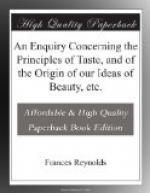In cultivated nations, every precept for exterior appearance, from the first rudiments of the dancing-master to the motion of grace, has for its object mind, that is, a desire to impress upon the spectator a favourable idea of our mental character; but, passed the true point of cultivation, they lose with the sentiment of mental excellence that of true beauty; witness the exterior artificial appearance of humanity in a neighbouring nation, which probably is on a par with the most uncultivated rustic. The one does not enough for nature, the other too much. But, as the former has an object before him, to which nature herself directs him, the other is receding from it; and, as it is more agreeable, more easy, and more natural, to the human mind, to learn than to unlearn, I should sooner expect the most uncultivated nation, the negro excepted, to arrive at taste in true beauty than them. The negro-race seems to be the farthest removed from the line of true cultivation of any of the human species; their defect of form and complexion being, I imagine, as strong an obstacle to their acquiring true taste (the produce of mental cultivation) as any natural defect they may have in their intellectual faculties. For if, as I have observed, the total want of cultivation would preclude external beauty, the total want of external beauty would preclude the power of cultivation. It appears to me inconceivable, that the negro-race supposing their mental powers were upon a level with other nations, could ever arrive at true taste, when their eye is accustomed only to objects so diametrically opposite to taste as the face and form of negroes are! Our being used or not used to the object cannot make us perceive any similarity in the lineaments of their countenance to the lineaments, if I may so say, of our refined virtues and affections, which alone constitute beauty; and therefore I am induced to believe that they are a lower order of human beings than the Europeans.
Beauty is an assemblage of every human charm; yet what we call the agreeable is often more captivating.
The agreeable, in person, is composed of beauties and defects, as is the common form, but differently composed. The beauties and defects of the latter are blended into the idea of mediocrity; those of the former are always distinct and perceptible, contrasting each other, they engage the attention, and create a kind of pleasing re-creation to the mental faculties; and, in proportion as we can bring them to unite with our governing principles of pleasure, they create affection, which gives the person a more fascinating charm than beauty itself.
It is the mental character that is the moving principle of affection; and any strong peculiarity, that contradicts not the moral sense, i.e. that is not unnatural, gives the object an accessary charm, and raises the affection to passion. The object is at once the common and the uncommon; an union, which constitutes all we call excellent, all we admire!




